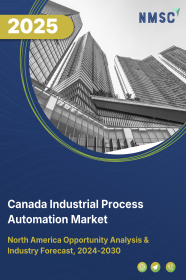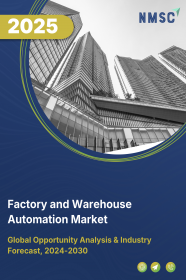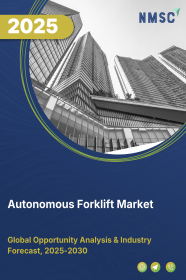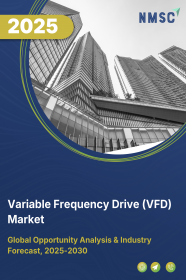
Canada Industrial Process Automation Market by Component (MES [Hardware, Software, Services]; DCS [Hardware, Software, Services]; PLC [Hardware, Software, Services]; SCADA [Hardware, Software, Services]; Field Instruments; Industrial Robots; Human Machine Interface; Industrial PCs; Process Analyzers & Drives) and by End User (Oil & Gas, Chemicals & Refining, Energy & Power, Pulp & Paper, Metals & Mining, Pharma, & Others) – Global Opportunity Analysis and Industry Forecast, 2025–2030
Industry: Semiconductor & Electronics | Publish Date: 14-Oct-2025 | No of Pages: 159 | No. of Tables: 121 | No. of Figures: 66 | Format: PDF | Report Code : SE980
Industry Outlook
The Canada Industrial Process Automation Market size was valued at USD 1.33 billion in 2024 and is projected to grow to USD 1.43 billion by 2025. Additionally, the industry is expected to continue its growth trajectory, reaching USD 1.88 billion by 2030, with a CAGR of 6.02% from 2025 to 2030.
Canada industrial process automation market is gaining momentum, fueled by government initiatives and rising labor costs. Policies, funding programs, and projects such as automation integration in mining are modernizing critical industries, boosting productivity, and positioning Canada as a hub for advanced manufacturing. At the same time, rising wages are compelling companies to adopt automation to streamline operations, cut costs, and enhance competitiveness, making automation a strategic necessity for long-term resilience and growth.
However, the market faces restraints due to a lack of standardization, which complicates system interoperability, drives up integration costs, and slows adoption. Looking ahead, the integration of artificial intelligence (AI) and machine learning (ML) presents a significant growth opportunity, enabling predictive maintenance, process optimization, and real-time decision-making that will strengthen productivity, innovation, and Canada’s global competitiveness in advanced manufacturing.
Government Initiatives in Automation Fuel the Canada Industrial Process Automation Market Growth
Government initiatives are significantly driving the industrial process automation market in Canada through policies, funding, and programs that encourage the adoption of advanced technologies. These projects aim to strengthen Canada’s innovation ecosystem, improve productivity, and modernize critical industries.
Additionally, the integration of automation in sectors such as mining is improving process optimization and efficiency, further propelling market growth. By promoting digital transformation and incentivizing companies to invest in automation, the Canadian government is positioning the nation as a competitive hub for advanced manufacturing on a global scale.
Rising Labor Costs Drive the Canada Industrial Process Automation Market Expansion
Increasing labor costs are becoming a critical driver of automation adoption in Canada. As wages continue to rise, industries are seeking automation solutions to improve efficiency, reduce human error, and lower operational expenses. Automation technologies allow firms to streamline manufacturing processes, achieve higher output, and maintain cost competitiveness with fewer employees. In response, many Canadian industries are embracing automation not only as a cost-saving measure but also as a strategic tool to remain competitive, resilient, and sustainable in an evolving economic environment.
Lack of Standardization Restrains Market Growth
Despite positive momentum, the absence of standardized frameworks remains a major restraint for the market. Without common standards, interoperability between different systems and technologies becomes challenging, complicating integration and reducing efficiency. This fragmentation discourages vendors from seamlessly connecting their solutions and increases costs for businesses attempting to deploy automation at scale. The lack of harmonized protocols also limits innovation, slows market adoption, and prevents industries from fully realizing the benefits of automation technologies.
AI and ML Integration Unlocks Future Growth in Industrial Process Automation
The integration of artificial intelligence (AI) and machine learning (ML) presents a significant opportunity for the market. These technologies support predictive maintenance, automate repetitive processes, and enable data-driven decision-making with minimal human intervention. By improving efficiency, quality control, and production optimization, AI and ML enhance both productivity and innovation across industries. As companies adopt these intelligent solutions, Canadian industries can strengthen competitiveness, achieve greater customization, and position themselves as leaders in advanced industrial technologies.
Competitive Landscape
The promising players operating in the Canada industrial process automation industry include Siemens AG, Mitsubishi Electric Corporation, Schneider Electric SE, Honeywell International Inc., Toshiba Corporation, ABB Ltd., Emerson Electric Co., Rockwell Automation Inc., Omron Corporation, Fuji Electric Co. Ltd., Valmet Oyj, Yokogawa Electric Corporation, Endress+Hauser, FESTO, and Dwyer Instruments Inc., and others.
Canada Industrial Process Automation Market Key Segments
By Component
-
Manufacturing Execution Systems
-
Hardware
-
Software
-
Services
-
-
Distributed Control Systems
-
Hardware
-
Software
-
Services
-
-
Programmable Logic Control
-
Hardware
-
Software
-
Services
-
-
Supervisory Control and Data Acquisition (SCADA)
-
Hardware
-
Software
-
Services
-
-
Field Instruments
-
Industrial Robots
-
Human Machine Interface
-
Industrial PCS
-
Process Analyzers & Drives
By End-User
-
Oil & Gas
-
Chemical & Refining
-
Energy & Power
-
Pulp & Paper
-
Metals & Mining
-
Pharma
-
Cement & Glass
-
Others
Key Players
-
Siemens AG
-
Mitsubishi Electric Corporation
-
Schneider Electric SE
-
Honeywell International Inc.
-
Toshiba Corporation
-
ABB Ltd.
-
Omron Corporation
-
Fuji Electric Co. Ltd.
-
Valmet Oyj
-
Yokogawa Electric Corporation
-
Endress+Hauser AG
-
FESTO
-
Dwyer Instruments Inc.
Report Scope and Segmentation
|
Parameters |
Details |
|
Market Size Value in 2025 |
USD 1.43Billion |
|
Revenue Forecast in 2030 |
USD 1.88 Billion |
|
Value Growth Rate |
CAGR of 6.02 %from 2025 to 2030 |
|
Analysis Period |
2024–2030 |
|
Base Year Considered |
2024 |
|
Forecast Period |
2025–2030 |
|
Market Size Estimation |
Billion (USD) |
|
Growth Factors |
|
|
Companies Profiled |
15 |
|
Market Share |
Available for 10 companies |
|
Customization Scope |
Free customization (equivalent to up to 80 working hours of analysts) after purchase. Addition or alteration to country, regional, and segment scope. |
|
Pricing and Purchase Options |
Avail customized purchase options to meet your exact research needs. |

















 Speak to Our Analyst
Speak to Our Analyst
























